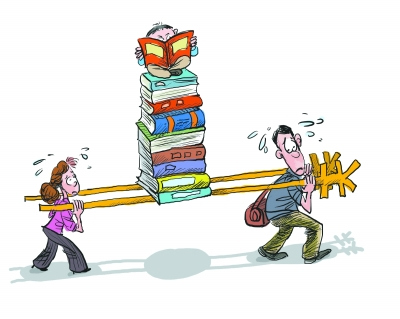
(Ecns.cn)--June is a dark month for many Chinese parents whose children are graduating from kindergarten or elementary school. Despite a system of compulsory education that calls for exam-free admission, many primary and secondary schools still set high hurdles for enrollment in order to get good students, exerting considerable financial pressure on parents.
According to the current system, students must attend schools located in their community. If they want to attend schools elsewhere, they must pay "school-choosing/selection fees." Such fees are often exorbitant.
Wen Feng, vice head of the Qinghua Education Group, tells China Newsweek that the Beijing-based Jingshan School charges school-selection fees as high as 250,000 yuan. That's the highest in the capital, followed by the Primary School Attached to Peking University (180,000 yuan) and Beijing No.2 Experimental Primary School (170,000 yuan).
Yet even such great sums don't guarantee complete success, as students might still fail the tough examinations required by top schools.
To be on the safe side, many parents try other, equally-expensive methods to get their kids enrolled, reports china.org.cn.
The most effective way is to buy an apartment in a community that already has good schools. However, this requires a huge investment given current real estate prices in big cities.
"Beijing's Haidian District, for example, has many famous schools, but the price of a 20-year-old apartment costs more than 20,000 yuan per square meter," Yang Hailing, whose son was in the second level of kindergarten, said in an interview with china.org.cn in 2009.
Another option is to seek help from an "influential" person to get a child into a good school. Such arrangements require bribery in the form of "red envelopes" and encourage corruption in school leaders.
Meanwhile, parents must still pay pricey school-selection fees.
The third way is to cultivate as many little geniuses as possible, training kids to solve difficult problems and acquire special talents such as basketball, dancing and drawing.
Statistics from the National Institute of Education Sciences show that over 80 percent of students at primary and secondary schools in Beijing had taken continuation classes, resulting in a highly profitable industry.
A report by China Youth Daily in 2011 revealed that each continuation course co-run by training institutions and famous schools costs as much as 8,000 yuan per year.
"Good middle schools are few in number, so the competition is fierce. Most children start to take various training courses in their third year of primary school," Ms. Yan, who lives in Beijing's Haidian District, told china.org.cn. Yan had been overcome with regret for not arranging a good middle school for her son.
"I didn't know the results of extracurricular examinations meant so much to school admissions until my son was in fifth grade. I applied for an English training course for him, but he failed the exam. I also tried to apply for some famous middle schools, but received no response," Yan complained.
Ren Baoju, an associate professor at Beijing Youth Politics College, said that Beijing schools give first priority to students who have rankings in various competitions, such as the Olympic Math Competition, the Spring Bud Writing Competition and the Public English Test System (PETS).
According to another survey of 14,081 people in 31 provinces by China Youth Daily in 2009, 98.5 percent of people have either chosen schools for their children or have seen others doing so. School selection has become a common practice across the country, reports china.org.cn.
The survey also found that 63.9 percent of the respondents regarded "the differences in school competencies" as the main reason for choosing. That was followed by "the pressure of entering college" (56.5%); "parents' overreaction to children's education" (55.5%); the "malfunction of a quality-oriented education policy" (48.8%); and "local governments' unbalanced investments in schools" (48.6%).
"The common interests of local education departments, schools and agencies have turned school-selection fees into a chronic disease," adds Xiong Bingqi, deputy director of the Beijing-based 21st Century Education Research Institute.
"First, unreasonable and insecure funding for compulsory education has prompted schools to charge such fees and even increase them with the passage of time. Also, the insecure financial state of schools is an important reason for the severe imbalance between schools in rural and urban areas and different regions of the country. The mechanism has not changed much even after government efforts to promote balanced compulsory education.
"Second, the severe lack of funds for compulsory education has worsened the situation. The National Audit Office surveyed 54 counties for funding of rural compulsory education from January 2006 to June 2007. The results showed that eight of the counties failed to allot funds as regulated, and five reduced the amounts instead of increasing them.
"And third, local governments have paid special attention to senior middle schools and high schools, because their quality of education determines the percentage of students from schools in their jurisdictions who clear the national college entrance exam and get admitted to prestigious universities. No wonder, even though the Compulsory Education Law says proportionate funds should be allotted to all sections of schools during the nine-year compulsory education, few local governments actually do so," Xiong was quoted by China Daily.
"The school-selection fees, which for all intents and purposes are illegal, should be banned immediately to ensure that compulsory education develops in a balanced and proper way. The funding security mechanism for compulsory education should be changed and efforts made at both national and local levels to increase the allocations. Besides, an education management system must be established to guarantee the public's right to participate in decision-making and supervision," Xiong suggested.

Copyright ©1999-2011 Chinanews.com. All rights reserved.
Reproduction in whole or in part without permission is prohibited.